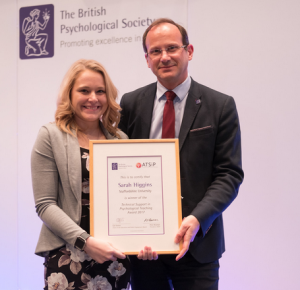
Dr Sarah Dean
The 5th of June 2017 marks World Orthoptic Day! Being a researcher in Health Psychology (and having an Orthoptist for a sister), I believe it is really important to support orthoptists in raising their profile.
Many people are unaware of the important role that orthoptists play in eye health. Orthoptists typically work in hospitals where they are involved in investigating, diagnosing and treating a range of eye related conditions, one of which is amblyopia or ‘lazy eye’, which is where my research interests lie. Orthoptists work with people of all ages from premature babies to older adults, and with a variety of medical conditions that can affect their eyes, such as diabetes and thyroid disorders. They may also work with people who are recovering from a stroke or brain injury. Overall, they are a vital part of the vision team!

Children with amblyopia have poor vision in one eye and without treatment this vision does not develop properly, meaning they have an increased risk of blindness. Treatment for amblyopia often involves the child being prescribed a patch to wear over their ‘good’ eye for part of the day. This forces the child to use their ‘lazy eye’ which allows the vision to develop. Although this treatment can work really well when used with children under 7 years old, a lot of people find it difficult to adhere to their prescribed treatment.
In my research I explore ways of improving adherence to treatment. In our paper, myself and my colleagues, Dr Rachel Povey and Jessica Reeves, investigated how effective existing interventions which aimed to increase compliance to patching treatment in children with amblyopia were. The next stage of the research will involve interviewing children to learn more about their experience of wearing an eye patch. Hopefully continuing with this research will lead to improved outcomes for children and will help to raise awareness of orthoptics.
Dean, S.E., Povey, R.C., Reeves J. (2016). Assessing interventions to increase compliance to patching treatment in children with amblyopia: a systematic review and meta-analysis. British Journal of Ophthalmology,100, 159-165.
Staffordshire University – The Home of Health Psychology
Staffordshire University’s Centre for Health Psychology is a  centre of excellence for teaching and research in Health Psychology, and is home to Staffordshire’s BPS Accredited Stage 1 MSc in Health Psychology and Stage 2 Professional Doctorate in Health Psychology. The Centre for Health Psychology is part of the Staffordshire Centre for Psychological Research.
centre of excellence for teaching and research in Health Psychology, and is home to Staffordshire’s BPS Accredited Stage 1 MSc in Health Psychology and Stage 2 Professional Doctorate in Health Psychology. The Centre for Health Psychology is part of the Staffordshire Centre for Psychological Research.
Keep updated with the latest Health Psychology news from Staffordshire University via following us on @StaffsPsych and via the #HealthPsychStaffs hashtag.
For further information about Health Psychology courses and research at Staffordshire University please visit the following webpages:








 in the use of ‘smart study drugs’ by university students in the UK, Dr Robert Dempsey (Lecturer in Psychology & Co-director of the
in the use of ‘smart study drugs’ by university students in the UK, Dr Robert Dempsey (Lecturer in Psychology & Co-director of the 





 the BSc (Hons) Psychology & Child Development) was featured on BBC Radio Stoke’s Sunday Morning Breakfast show discussing recent debates about competitive (or ‘pushy’) parenting and the effects on children’s development. Dr Rose discusses some of the psychological theory behind parenting styles which encourage competitive behaviour and whether this is beneficial for child development.
the BSc (Hons) Psychology & Child Development) was featured on BBC Radio Stoke’s Sunday Morning Breakfast show discussing recent debates about competitive (or ‘pushy’) parenting and the effects on children’s development. Dr Rose discusses some of the psychological theory behind parenting styles which encourage competitive behaviour and whether this is beneficial for child development.



